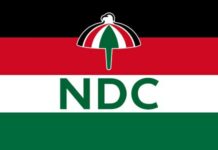The Speaker of the 6th Parliament, Rt. Hon. Edward Doe Adjaho, has called for an all-inclusive review of the government’s pro-poor policy, the Free Senior High School (SHS).
The former Speaker is advocating for the stakeholders’ conference on the sustainability, and revitalisation, as well as to re-examine the calibre of SHS products the country needed and deserved.
Mr. Adjaho said it was becoming increasingly clear that the time had come to review the current implementation of the programme, to enable the country come together and fix challenges confronting the system.
He outlined some of these challenges as congestion, lack of teaching and learning materials, funding, poor dinning conditions, acute shortages of food supplies, and double track among others.
The former Speaker of Parliament, who was speaking at the 60th Anniversary launch and sod-cutting ceremony for an ultra-modern digital resource centre for the Frankadua D/A Junior High School (JHS) in the Asuogyaman District of the Eastern Region, said: “As a country, we cannot pretend that all was well in the educational sector of the country, and we need to sit up,” he stressed.
Mr. Adjaho continued that lack of infrastructural expansion and deteriorating facilities could not be said to be the best educational system needed for the growth of the country.
He stressed that it was important to be mindful not to be interested only in mass production of SHS graduates without considering quality, and hoped that there would be an educational system that would foster national cohesion, by giving equal opportunities to the urban and rural students to develop their talents without discrimination.
Touching on the theme “Digital Literacy; A tool for National Development,” the former Speaker of Parliament noted that for the occasion it was apt, in view of the importance of digital education that had become necessary as a result of COVID-19, which, he said, had altered the way of life of Ghanaians.
He observed that digital transformation had totally revolutionised the educational landscape and concepts such as virtual learning, e-learning, remote-learning and blended learning were no longer considered novel, but crucial to the education of students.
Mr. Adjaho said a recent study published under the title ‘Digital Transformation in the Age of COVID-19,’ revealed that shortly after the outbreak of the pandemic, internet traffic increased by 60 per cent, and became more beneficial to only those who had access.
He stressed that the United Nations International Children Education Fund (UNICEF) warned that some 616 million students remained affected by full or partial school closures due to the COVID-19 destructions in Africa.
The Asuogyaman District Director of Education, Mrs. Augustina Adjoa Owusu, lauded the Frankadua D/A JHS for its high performance over the years, in terms of academics, stressing that it was one of the best public basic schools in the District.
Mrs. Owusu said the Directorate was proud of the teachers and non-teaching staff, the School Management Committee, and the Parent Teacher Association (PTA) for maintaining high academic standards over the years, which was difficult to achieve in many public basic schools.
She further appealed to parents to continue to support their wards, and asked students to learn hard to justify the investment the government and their parents were making.
The Headmaster of the Frankadua JHS, Mr. Harrison Mompi, thanked the Old Students Association of the school for their continued support and gave the assurance that the teachers were committed to their work, a reason for which the school continued to perform creditable at the Basic Entrance Certificate Examination.









